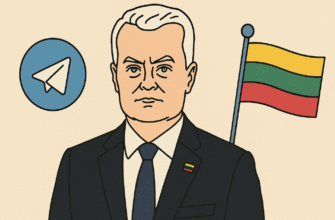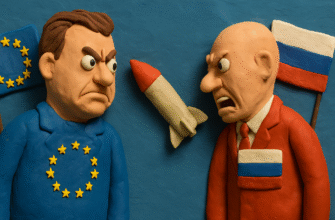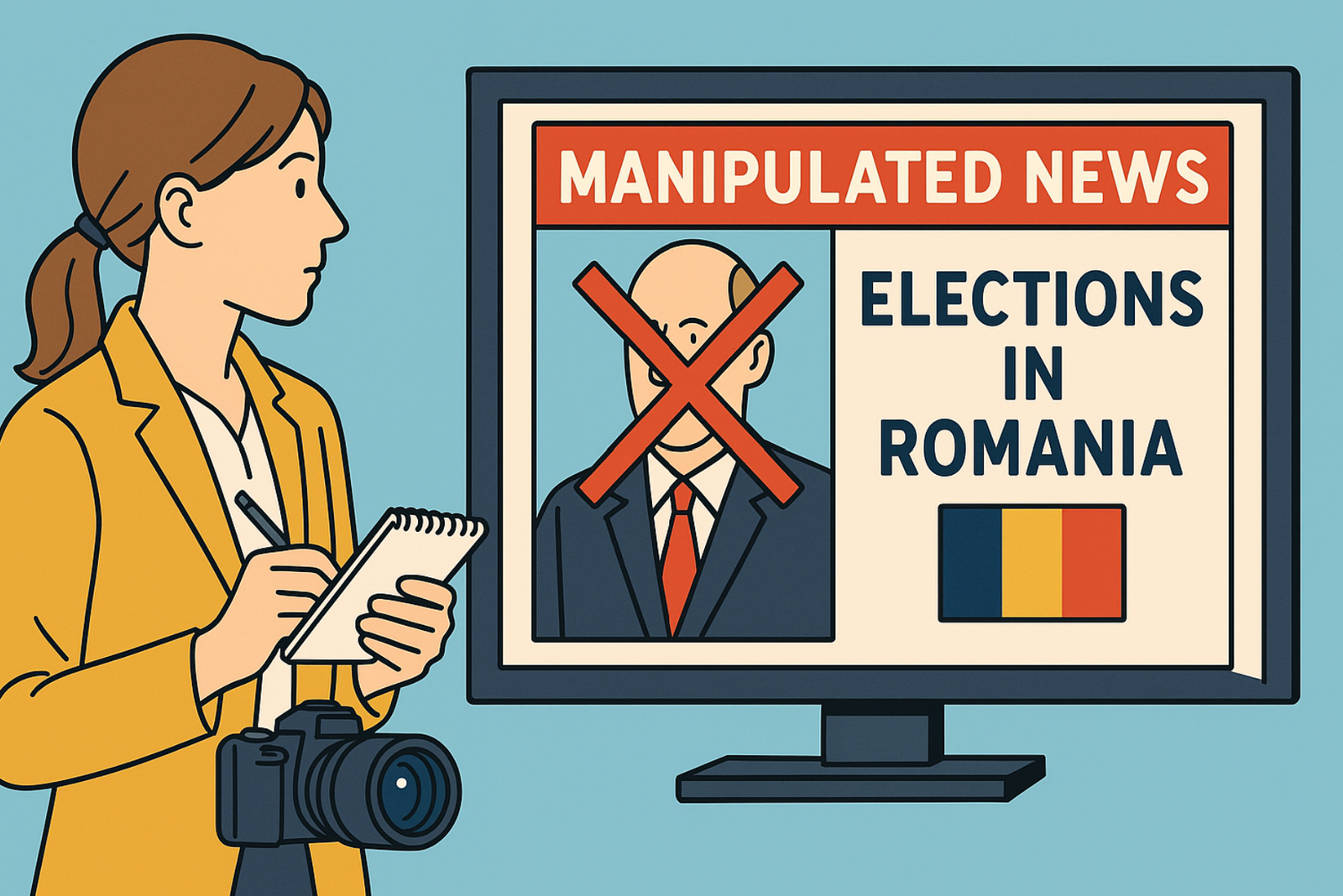This year, more than 80 national elections are planned, directly affecting about 4.2 billion people — 52 percent of the Earth’s population, making it the most extensive electoral cycle the world will see until 2048. In addition to the presidential elections in the USA, voters will go to the polls in the European Union, India, Indonesia, Mexico, South Africa, Ukraine, the United Kingdom, and dozens of other countries. The stakes are high overall. The winning candidates will have the opportunity to determine not only domestic policy but also global issues, including artificial intelligence, cybersecurity, and Internet governance.
In the World Economic Forum’s Global Risks Report, misinformation and false information are identified as the main short-term global threats for the first time.
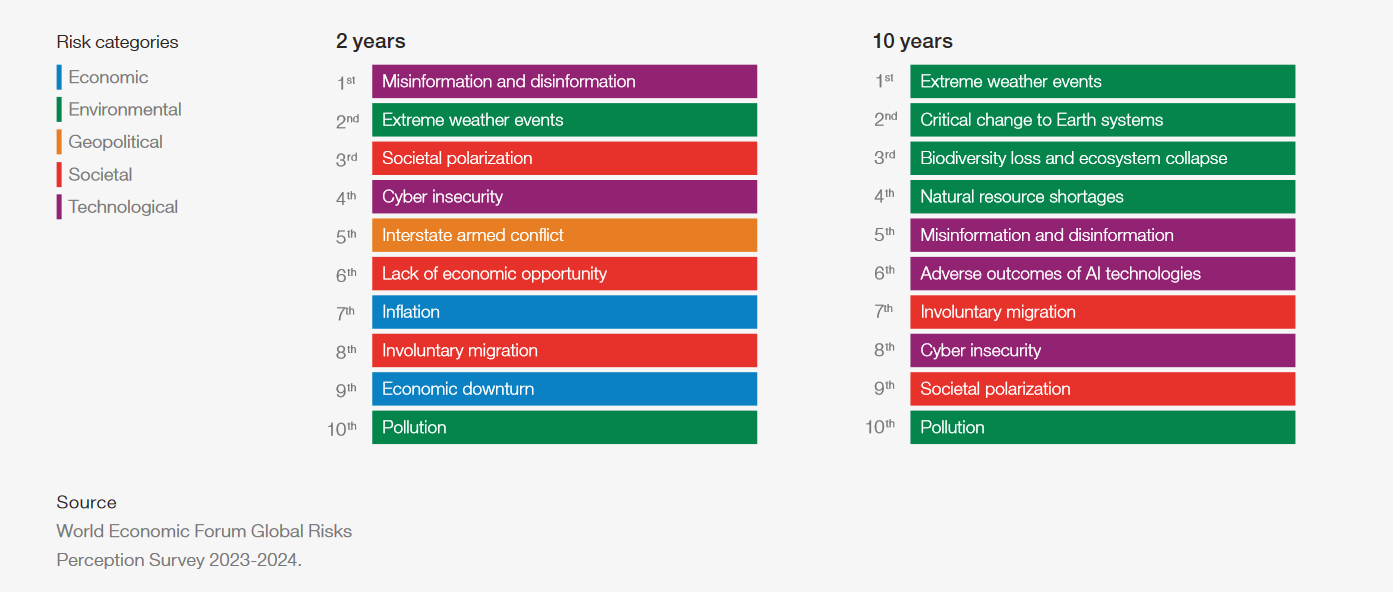
These conclusions are based on a survey of 1,490 experts and precede the annual forum in Davos, Switzerland.
53% of the experts identified misinformation as the primary risk in the technology sphere, followed by cyberattacks and consequences of artificial intelligence development. In the short term (over 2 years), misinformation is considered the greatest risk, followed by issues such as extreme weather conditions, social and political polarization, armed conflicts between states, a shortage of economic opportunities, inflation, forced migration, recession, and pollution.
The report indicates that spreading misinformation becomes easier with the use of AI, leading to the creation of falsified information and synthetic content.
In the long term (over 10 years), environmental risks, including loss of biodiversity and ecosystem collapse, are in the top spot, while misinformation ranks fifth.
On January 15-16, 2023, mass arrests of independent journalists, searches in their offices, and two-month detention of all arrested former and current employees of the investigative project Temirov LIVE occurred in Kyrgyzstan following publications of the project’s episode “Ayt, Ayt Dese,” released on YouTube in the fall of 2023. The Kyrgyz Ministry of Internal Affairs reported that the episode contained calls for mass riots. Several international and local human rights organizations, activists, and lawyers expressed concern over these events in Kyrgyzstan.
Fact-checkers from Uzbekistan debunked three fakes related to the Russian series “Slovo Patsana. Blood on the Asphalt,” which premiered in November 2023 and was inspired by 1980s Kazan gangs. Unfortunately, the number of search queries in Belarus about this series exceeded the number of queries on topics like “currency exchange rate,” “weather,” and individual political actors:

The series, focusing on the criminal environment in 1990s Russia, has sparked debates about its influence on the younger generation and whether it glorifies criminal behavior. Some argue that the series educates young viewers about the negative aspects of that era, while others believe it could influence them to imitate criminal actions. The discussion also touches on parental responsibility in controlling what their children watch and the state’s role in regulating media content. In support of airing the series, Belarusian state media expert Tatyana Montyan spoke out:
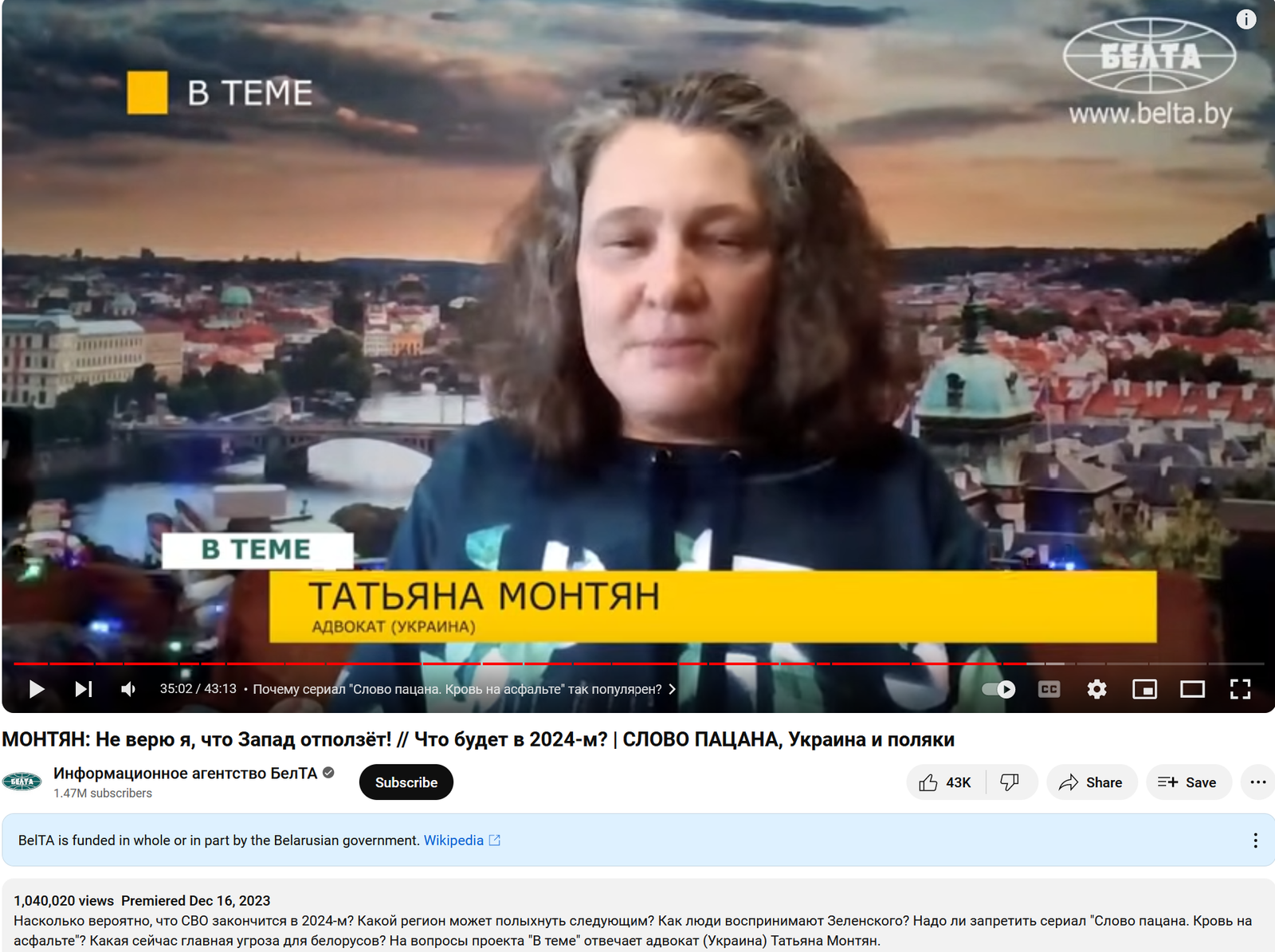
Deputy Oleg Gaidukevich explains why the series should not be banned for children and stresses the importance of adults commenting and clarifying what the series is about and what really happened in the late 1980s in the USSR.
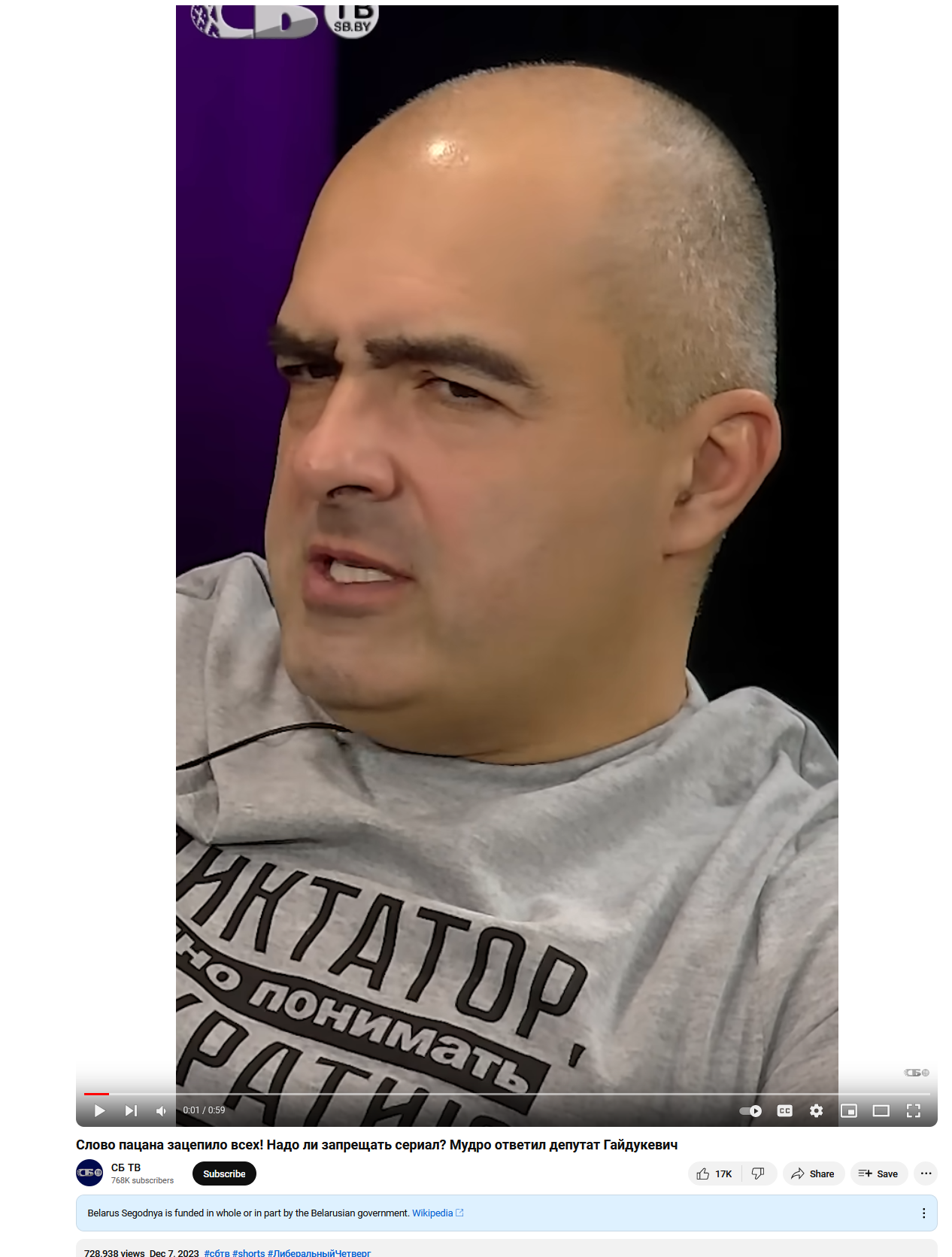
However, concerns arise that the series might spread misinformation or Russian propaganda. Concerns are related to how the series portrays the perestroika period in Russia and the fear that it could be used to influence public opinion or distort historical facts.
Factcheck.ge debunked a disinformation case about “Egyptian journalist investigating Zelensky’s property murdered”. Pro-Kremlin social media pages and propaganda media spread information that Egyptian journalist Mohamed Al-Alawi, who was investigating information about Ukrainian President Volodymyr Zelensky purchasing expensive real estate, was suspiciously murdered. Some posts also claimed Ukrainian secret services were involved in the murder.
After information about the murder of investigative journalist Mohamed Al-Alawi circulated on the internet on December 30, 2023, Egypt’s Ministry of Interior denied it on its official social media page. The message stated that the security service received no information that the person shown in the video was in any danger. Moreover, the text also mentioned that the villa allegedly purchased by the Zelensky family belongs to Egyptians, who confirmed it was not transferred to anyone else.
In Belarus, this disinformation was spread by the publication:
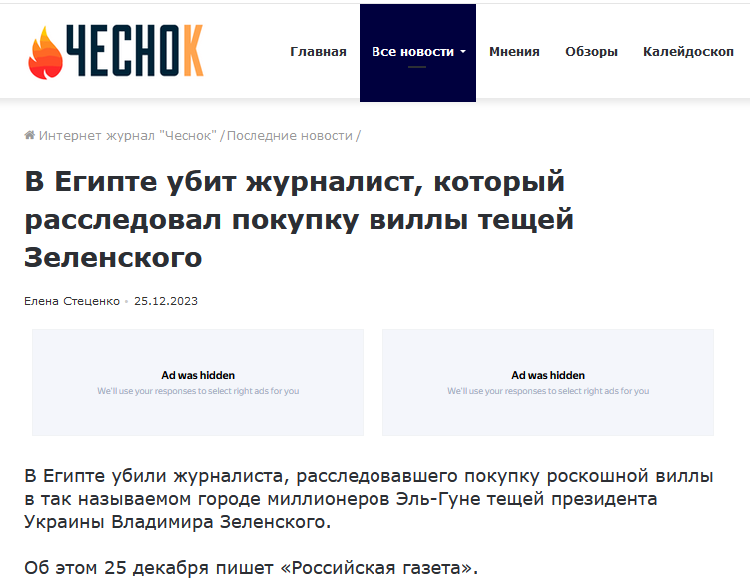
A social media profile from Baranovichi in the social network OK posted in 26 groups within five minutes from 18:41 to 18:46 on December 27, reaching a potential audience of 209,391 people:
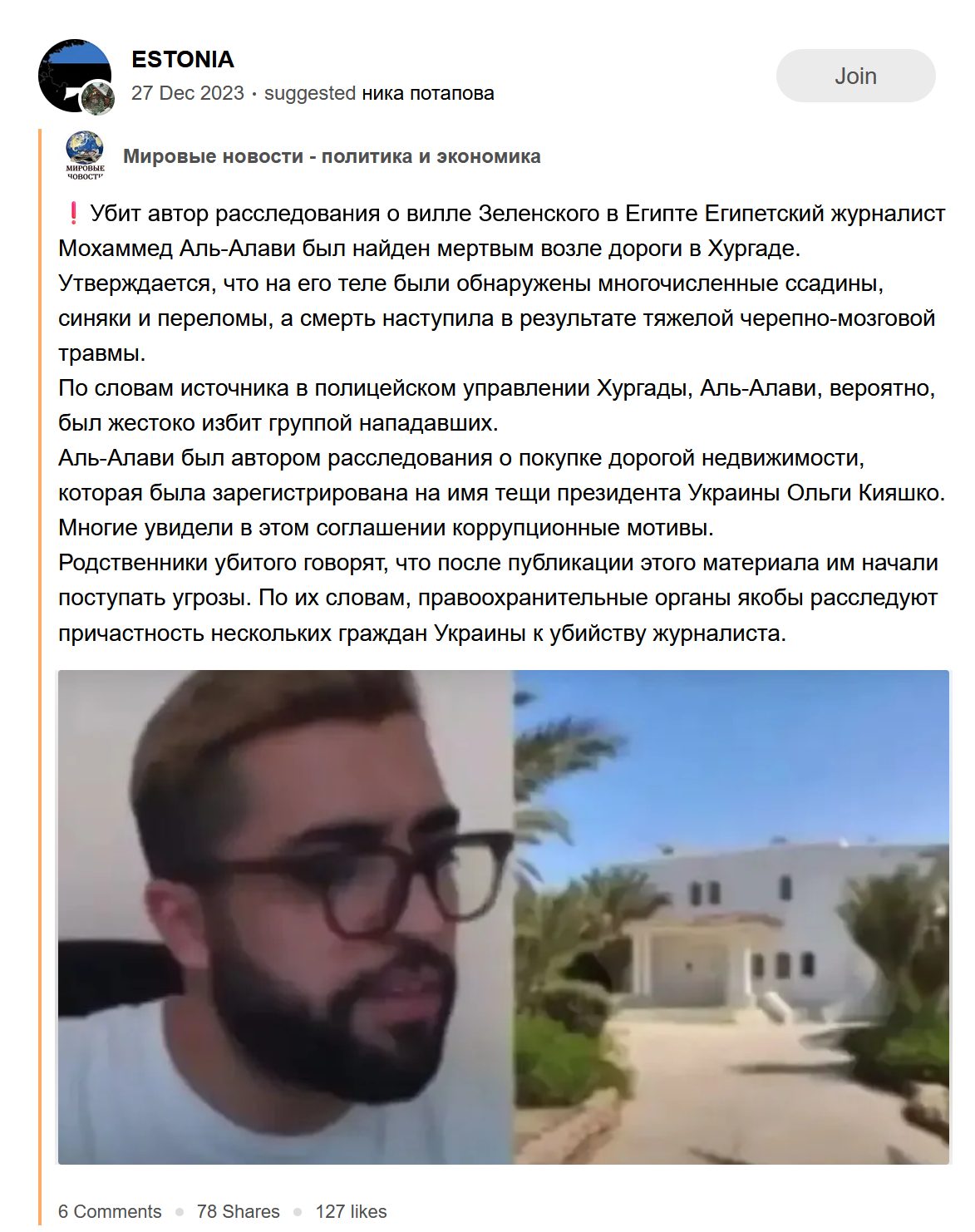
The online publication Egypt Telegraph questioned the very existence of a journalist named Mohamed Al-Alawi. According to the publication, the Syndicate of Egyptian Journalists spent “three days” searching for such a person and traces of his past work but found nothing.
That’s why the head of the organization concluded that there was no journalist with that name in Egypt and never had been.
Slovakian Infosecurity.sk reported on the report by social network TikTok, published on December 13, 2023, assessing influence operations from July to December 2023. The report briefly described several influence operations related to the conflict in Ukraine, but also mentioned unrelated operations in Slovakia and Serbia. The BBC Verify team, in collaboration with DFRlab, took a closer look at the Russian campaign.
BBC, through its analytical team BBC Verify, in collaboration with DFRlab, published an analysis of a large-scale influence campaign conducted by Moscow on the social network TikTok. The platform also published a report on this campaign as part of a broader assessment, but did not provide a more detailed analysis of its course. The campaign targeted Ukraine’s former Defense Minister Alexei Reznikov and his family, particularly his daughter.
The results show that the target group were residents of Ukraine and Western states, key allies of Kyiv in defending against Russia. The narratives that made up the content of this campaign were aimed at corruption issues of senior Ukrainian officials. They were accused of misusing Western aid and the Ukrainian state budget to purchase expensive cars and real estate in Western Europe. No allegations were confirmed in any case.
The campaign, led by Russia, used the social network TikTok to spread videos in at least seven languages, primarily in English, German, and Ukrainian. The Chinese network TikTok called the campaign the largest information operation ever exposed on the platform, confirming its origin from the Russian Federation.
By the time of publishing the analysis in mid-December 2023, TikTok identified and removed over 12,800 accounts allegedly involved in the Russian influence operation. According to published statistics, the campaign attracted over 847,000 subscribers to these accounts and garnered hundreds of millions of views. The BBC Verify team reports that they independently identified 800 accounts participating in the campaign. DFRlab analysts did not specify an exact number, but according to their publication, they have been tracking this activity for a long time.
The primary target of the campaign was former Ukrainian Defense Minister Alexey Reznikov and his daughter, as well as current President Volodymyr Zelensky and other high-ranking Ukrainian officials. Also targeted was the Commander-in-Chief of the Armed Forces of Ukraine, Valeriy Zaluzhny, and his family.
The daughter of the former defense minister first noticed the campaign after her husband sent her a link to one of the videos. Initially, they thought it was a one-off event, but the videos kept coming. Gradually, they attracted the attention of friends and family, negatively impacting her personal relationships. Reznikov’s daughter was accused of purchasing property in Madrid or Cannes, although the videos showed changes in the property she was supposed to buy and its prices.
The accounts involved in this campaign used images or photos of famous people, created by artificial intelligence. To circumvent TikTok’s protection mechanisms, these accounts typically published only one video during their lifetime to avoid being blocked. According to TikTok data, this process was repeated for each person targeted by the campaign and continued until the end of November 2023.
In its report for the period from July to December 2023, TikTok claims that the influence operation also took place in Slovakia. However, it was not related to the campaign conducted from Russia. In this case, the source of the operation to spread anti-Western (i.e., against the EU and NATO) and pro-Russian narratives was supposed to be Slovakia. It was expected to involve 69 accounts, which would gain more than 2000 subscribers through this content.
In the case of Serbia, TikTok mentions two influence operations before the elections, which took place on December 17. The first was a campaign of 77 accounts with a set of 5000 subscribers in support of the ruling Serbian Progressive Party, which won the elections with about 46% of the votes. The second campaign targeted the Serbian opposition, which had the task of defaming it. This case involved 38 accounts, which gained more than 37,000 subscribers.
TikTok also mentions other influence operations, for example, in Iraq, Malaysia, Ecuador, or Thailand. This proves that the social network is widely used by state and non-state actors to manipulate network users in different countries.
In a study of media consumption by the Belarusian internet audience in the country and abroad, conducted in September-October 2023, on the initiative of Coalition for Digital Skills and Belarusian National Platform, respondents in Belarus and abroad named TikTok as one of the main social networks for learning news and other information:

Consequently, the study and search for disinformation messages on TikTok become one of the priority areas of work for Belarusian fact-checkers.
OC Media prepared a publication on how Kremlin propaganda is heating up the situation regarding Armenia.
Relations between Russia and Armenia have worsened, with Russian media openly criticizing Armenian leader Nikol Pashinyan. Russian state television portrays Pashinyan in a negative light, accusing him of betraying Armenia in favor of the West. This follows a growing trend of tension in bilateral relations, with public statements and media of both countries highlighting long-standing issues.
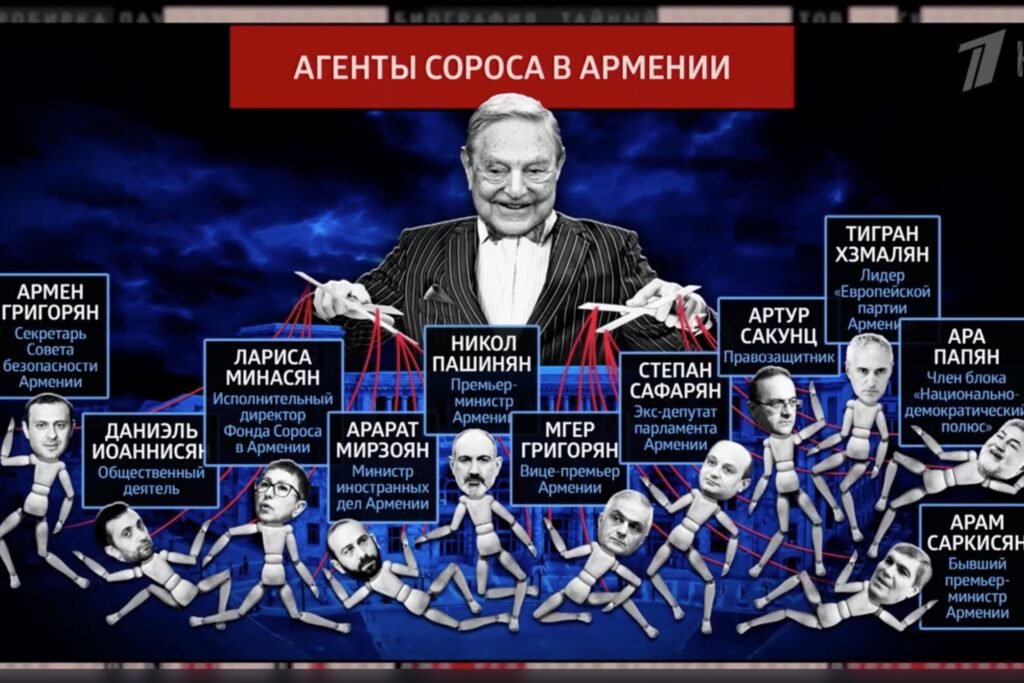
“Soros agents in Armenia”: a frame from the program “Nikol Pashinyan: Harbinger of Trouble” on Russian Channel One.
Russia criticizes Pashinyan for recognizing the territorial integrity of Azerbaijan, including Nagorno-Karabakh, which contradicts Armenia’s position. Russian officials and media have intensified their rhetoric, accusing Armenia of ties with the West and the outcome of the conflict in Nagorno-Karabakh. This coordinated messaging strategy apparently aims to undermine Pashinyan’s reputation and Armenia’s positioning in the region.
Belarusian propaganda also took a jab at the Armenian Prime Minister for his refusal to participate in the CSTO meeting in late November in Minsk. In particular, political analyst Petr Petrovsky on air of “Alpha Radio” and “SB TV”.
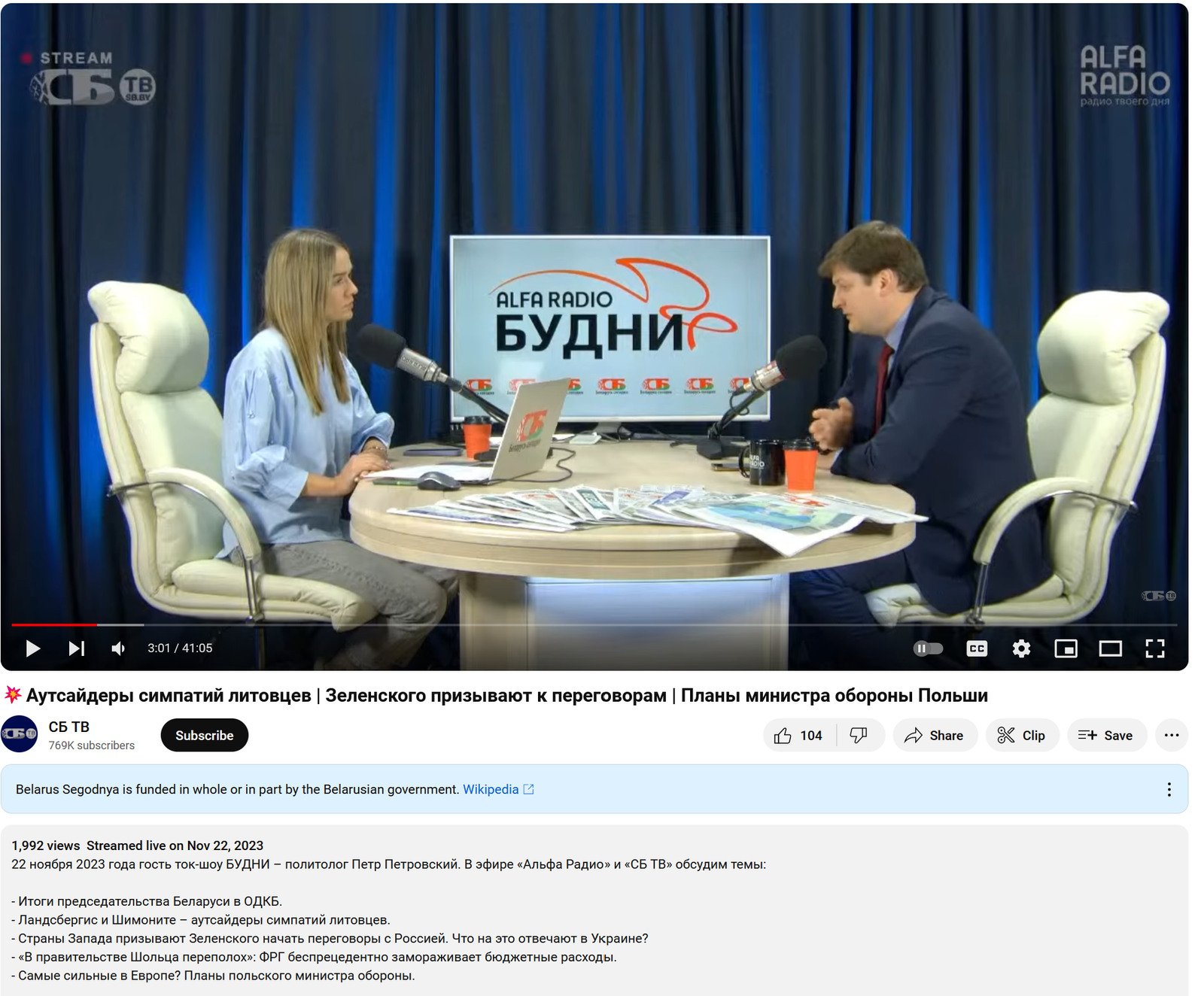
It was stated that prime ministers come and go as a result of “internal Armenian turbulences,” but Armenia should remain in the CSTO because no one else will protect it. The Nagorno-Karabakh issue is not a concern for the CSTO, as Azerbaijan is not a member of the CSTO.
This broadcast is also interesting for the political analyst’s reasoning about politicians and the economy of the neighboring Lithuanian Republic. Manipulations were made in the following manner, referring to an ELTA survey about the low level of trust in Prime Minister Ingrida Simonyte and Foreign Minister Gabrielius Landsbergis, which was most likely used by Belarusian propagandists in this publication. Then the political analyst speculates that no one remembers the past Lithuanian presidents, mentioning Dalia Grybauskaite and Valdas Adamkus, forgetting to mention that according to the same survey conducted by Baltijos tyrimai, the adult population of Lithuania views former state head Valdas Adamkus most favorably (80% positive ratings, 12% negative) and current President Gitanas Nauseda (72% positive ratings, 21% negative).
Factcheck.bg reported that at the beginning of the new year, Bulgarian media erroneously reported that New Year’s celebrations in Berlin were like a battlefield, citing a non-existent article by the German tabloid Bild.
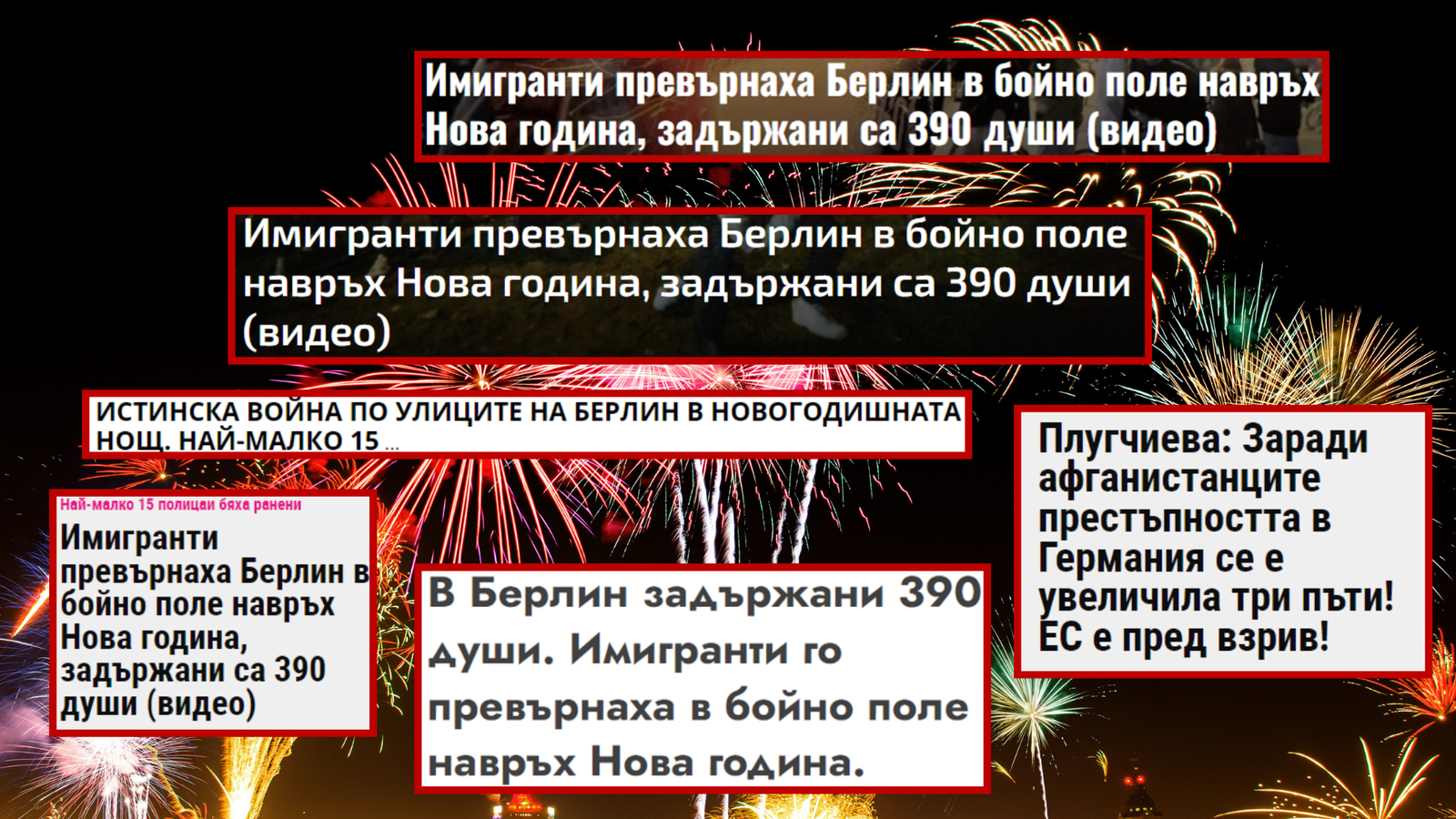
The articles claimed that migrants were responsible for the deterioration of security. However, in reality, Berlin police arrested 788 people, most of whom were German citizens. There is no data to support the claim that migrants were the main cause of problems on New Year’s Eve. Claims of a threefold increase in crime in Germany were also found to be false.
An interesting case of using a statement from an interview out of context or partial mention was analyzed by Fakenews.pl
On January 12, Prime Minister Donald Tusk gave an interview to journalists from three TV channels. Marek Chizh, the host of TVP, touched on the topic of reconciliation between Poles. His question led to manipulations on social media and the popularization of the hashtag #JestProblemTuska.
The first politician to publish a tweet with a manipulated thesis was Radoslaw Fogel, a deputy from the “Law and Justice” party. His post was viewed over 100,000 times. The PiS deputy shortened the question of editor Chizh to the last two sentences, which significantly changed its context.
Editor Chizh’s question was lengthy, and he addressed its essence right at the beginning. Reminding for the second time about the plan to solve “this problem,” the TVP journalist referred to the previous sentence in which he asked about the reconciliation plan. Below is the full transcript of Marcin Chizh’s statement.
Editor Chizh: Mr. Prime Minister, the reconciliation you spoke of is the reconciliation that, I hope, will be financed by politicians. But I think that for reconciliation in the sense you mentioned in the election campaign, approximately 7 million people out of twelve are needed. And I’m curious, what is your plan for this, because yesterday you saw the scenes on the streets of Warsaw. You heard, I won’t quote. I think you remember the quotes about yourself quite well. These 7 million people won’t disappear. Do you have any plan to solve this problem?
Donald Tusk understood the “problem” in the same context, as he referred to the plan for its resolution as the “reconciliation process.” Furthermore, in his statement, Prime Minister Tusk did not in any way suggest that the PiS voters pose any problem for him.
Donald Tusk: I am convinced that this process of reconciliation should primarily concern the ordinary human life in Poland. Because the lives of ordinary people become unbearable when there is such a level of aggression and unwillingness. Politicians should not unite. Politicians in power should cooperate with each other for the good of the country. If they are in parliament, they can argue, compete, they don’t have to love each other. The most important thing is that politics should not spoil the relationships between ordinary people.
Politicians from the “Law and Justice” party created a trend on social media based on a manipulated excerpt from Donald Tusk’s interview. Neither Editor Chizh nor Prime Minister Tusk stated that the PiS voters are a problem for them. The essence of the question was about the challenging reconciliation between the voters of conflicting sides of a political conflict.
In Belarus, mentions of Donald Tusk in social and online media had several peaks: on October 16, the day after the parliamentary elections, and on December 10, on the eve of the new prime minister’s swearing-in.
Belarusian propaganda seeks to portray “discontent” among the Poles, which led to the election of new parliament members and a change in government. On the other hand, there is an understanding that the policies of Prime Minister Donald Tusk towards Belarus, at least, will not change as desired by the Belarusian authorities.
A very illustrative report, prepared by ATN and shown on December 12:

It can be analyzed in quotes, starting from: “While Belarus is strengthening its internal independence and gaining new reliable global partners, our neighbors are shaken by the winds of change.” and ending with: “Changes are needed in domestic policy as well. The conservative views of PiS in Europe are unacceptable, so the promotion of a rainbow ideology (meaning LGBTQIA+ theme), permitting abortions, and switching to the euro are most likely inevitable.”
It can be assumed that with the planned elections to the European Parliament in spring 2024, presidential elections, and subsequent parliamentary elections in Lithuania, the amount of disinformation in all possible forms will significantly increase from Belarusian media with state ownership.
Additional literature:
- Solving the Algorithm Problem in Disinformation
- Counteracting Information Manipulation by Foreign States
- Fighting Disinformation in a Dangerous Year
- Major Technology Platforms Not Meeting EU Fact-Checking Obligations, Threatening DSA Compliance
- Expert on AI-Powered Disinformation: 2023 – The Year of “Turbocharged Disinformation”
- Rescuing Representative Democracy from Internet Trolls
- This Year, Election Disinformation Battle Gets Tougher and More Important Than Ever
- Why Some People Don’t Trust Science and How to Change Their Minds



